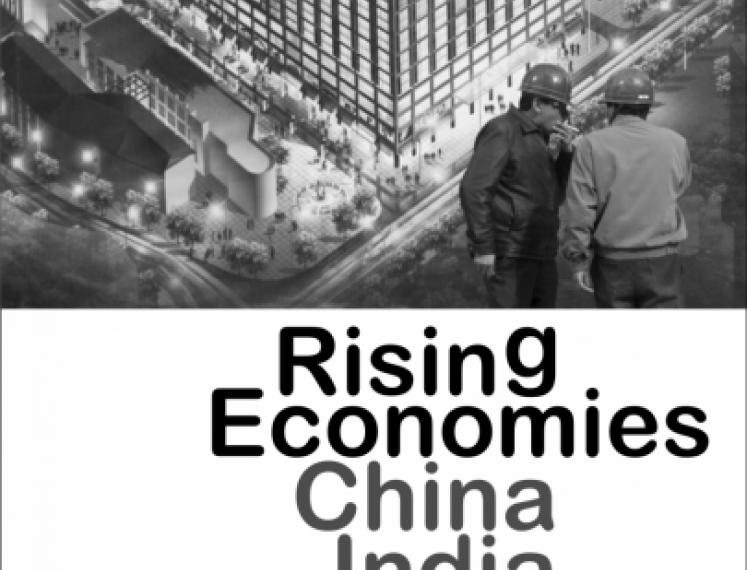Rising Economies
The economic world order is changing rapidly. American hegemony has passed its peak and emerging market countries are lining up to take over. Expectations are that the fast growing economies of Brazil, Russia, India. The four BRIC countries are at first glance an unlikely coalition. But what they have in common are their large populations, their huge economic potential and their fast economic growth. Last summer, the first BRIC summit was a symbolic rejection of American and EU hegemony in global economic and political decision making.What are the strengths and the weaknesses of these rising economies? How will they endure the financial and economic crisis? And will they, in the decades to come, overshadow the current richest countries of the world?This lecture series is organised in cooperation with the Faculty of Economics and Business of the University of Groningen.
China
The End of Fast Economic Growth?
Bart van Ark

Date: Tuesday 19 January 2010

After years of spectacular economic growth, and a short regression due to the global financial crisis, the question is how long the Chinese economy can sustain its rapid growth. The growing demand for resources, the shortage of skilled work force, the big environmental problems, the rising wages and the shift from export to consumption, are the signs of a forthcoming delay in the economic growth. How will the Chinese leaders cope with this change and how will the rest of the world react? Will China still have big opportunities that can be exploited? An outline of the economic perspective of China, supported by views from the business world and international policy makers.
Bart van Ark is Chief Economist of The Conference Board, a global research organization with its head office in New York City. He is a part-time Professor of Economic Development, Technological Change and Growth at the University of Groningen.
India
Beyond Growth: Challenges and Opportunities
Joyashree Roy

Date: Tuesday 26 January 2010

India holds over 16 percent of today’s world population and is expected to be the most populated country by 2030. More than 50 percent of the population is in the age group of 15-35 and a large share still depends on the rural system. This provides both opportunities and challenges. In decades to come, the Indian economy will need to resolve its focus on faster economic growth, in a world where aspirations go beyond growth alone. Social justice and environmental quality are equally important goals in conjunction with efficient economic growth. For countries like India, which are the late comers in the development process, a unilateral economic growth agenda may no longer be possible. Human well-being will be the main driver of the growth process of these new economies. How fast a sustainable transition will be achieved by the Indian economy, will depend on technological choices along with innovation of the social system.
Joyashree Roy is Professor of Economics and Coordinator of the Global Change Programme of the Jadavpur University, Kolkata, India.
Russia
The Russian Federation as New Superpower?
Herman W. Hoen

Date: Tuesday 2 February 2010

Since the downfall of the Soviet Union, the Russian Federation tried to implement a market economy embedded in a democratic order. The transition brought enormous difficulties. In the beginning of the 1990s, Russia faced a dramatic decline in economic activity and, after a brief period of recovery the federation suffered from the ‘ruble crisis’. The initial stages of transition revealed the decay of a superpower. At the turn of the millennium, there was a recovery. The Russians could reap the benefits of liberal market reform, but there was an effective political centralization as well. These two developments led to the conviction that the Russian Federation, again, would play an essential role in world politics. Currently, Russia is disproportionately hit by the financial crisis. The crisis reveals the downside of a market economy. The question to be addressed is whether there will be light at the end of the tunnel or the lights of a train coming in front.
Herman W. Hoen is Professor of International Political Economy of the University of Groningen, specialised in European integration and transition processes in Central and Eastern Europe.
Brazil
Challenges in a Changing World
Joaquim Guilhoto

Date: Tuesday 9 February 2010

The Brazilian economy has been calling attention all over the world, not completely for what it is, but for what it can be. The size of Brazil, its natural resources, and its social problems are certainly on the agenda, not to mention the role to be played by Brazil in the group of developing countries and more specifically among the BRIC nations. However, one of the striking questions is: will Brazil really take off, or is the potential of the Brazilian economy just a bubble of expectations that will soon explode? This is not an easy question to answer. A deep look into the Brazilian economic history and in its productive structure can help to explain its present development as a competitive open market economy. Nevertheless, remaining challenges are the need for a tight control over the government spending, the level of education, the concentration of income, the poverty level and environmental questions that need to be faced in a changing world.
Joaquim J.M. Guilhoto is Professor of Economics and former Head of the Department of Economics at the University of São Paulo (USP), Brazil. He is also associated with the Regional Economics Applications Laboratory (REAL) at the University of Illinois, at Urbana-Champaign USA.


